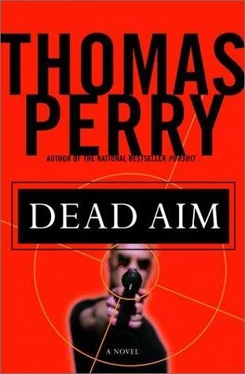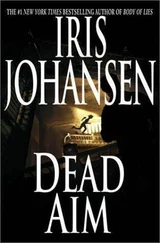Thomas Perry - Dead Aim
Здесь есть возможность читать онлайн «Thomas Perry - Dead Aim» весь текст электронной книги совершенно бесплатно (целиком полную версию без сокращений). В некоторых случаях можно слушать аудио, скачать через торрент в формате fb2 и присутствует краткое содержание. Жанр: Триллер, на английском языке. Описание произведения, (предисловие) а так же отзывы посетителей доступны на портале библиотеки ЛибКат.
- Название:Dead Aim
- Автор:
- Жанр:
- Год:неизвестен
- ISBN:нет данных
- Рейтинг книги:4 / 5. Голосов: 1
-
Избранное:Добавить в избранное
- Отзывы:
-
Ваша оценка:
- 80
- 1
- 2
- 3
- 4
- 5
Dead Aim: краткое содержание, описание и аннотация
Предлагаем к чтению аннотацию, описание, краткое содержание или предисловие (зависит от того, что написал сам автор книги «Dead Aim»). Если вы не нашли необходимую информацию о книге — напишите в комментариях, мы постараемся отыскать её.
Dead Aim — читать онлайн бесплатно полную книгу (весь текст) целиком
Ниже представлен текст книги, разбитый по страницам. Система сохранения места последней прочитанной страницы, позволяет с удобством читать онлайн бесплатно книгу «Dead Aim», без необходимости каждый раз заново искать на чём Вы остановились. Поставьте закладку, и сможете в любой момент перейти на страницу, на которой закончили чтение.
Интервал:
Закладка:
Mallon came through Ojai at one-twenty A.M. He drove past the long, low row of stores along the main street, and reached the block with the overhanging roof and the tan fake adobe arches and pillars, still watching for a sign that anybody was awake and paying attention to him. The sight of the place brought back an old memory. During the brief period after the divorce, when he had discovered he was wealthier than he had imagined, he had considered Ojai as a place to live. He had driven along this street and liked the architecture. He had spent a day thinking about acquiring a block of businesses farther up the street and rebuilding them in the same Spanish-revival style, but his enthusiasm had faded with the sun. He’d had a quiet dinner in his hotel and admitted to himself that he could not go through with the project. It had seemed to him that going into another business was so unnecessary that it amounted to an absurdity, an indefensible vanity, like French aristocrats pretending to be shepherds and shepherdesses while real peasants starved.
Tonight those times seemed to Mallon to be distant, almost unimaginable, his concerns outgrown like the concerns of a child. Suddenly, he decided that he knew something more about Catherine Broward. He had never thought clearly about what happened when a person took the life of another human being. Now he knew, and he was beginning to understand why Catherine had been so determined to drown herself. Seeing what could be done to another person, the harm that needed to be done to a human body to kill it, was a minor revelation. The bigger revelation was that once a person had done that to someone, he was changed too.
Catherine must have felt different afterward. The knowledge, the memory of killing her boyfriend, had made her feel tarnished and diminished. She had wanted the feeling to end, but it didn’t end. That was why she had been so determined: she believed that if she lived another day or a decade, there would be no improvement. Mallon knew that he too had changed, but his change had been different, and it felt like a clarification of his vision. He did not feel regret, or mourn the loss of the men he had killed, or search for a way that he could have avoided it so he could accuse himself of not having tried hard enough. He hated them. He was relieved that they were dead, and that he was not. The reward of victory was being alive.
Mallon was already through Ojai, and the road to the north was narrower and darker. There were no cars now but his. He endured a long period when nothing looked familiar to him. The trees seemed thicker and taller than he remembered, the dark hills lay in new patterns. He wondered how he could have gotten onto the wrong road. But then he saw a configuration of rocks that he had seen when he’d come here with Lydia-just a flash in the headlights, but undeniably the same-and then the turnoff to the right that led eastward into the hills. He drove from there unerringly to the spot where the high chain-link fence around the self-defense camp began. He resisted the temptation to turn his headlights off. If anyone inside the camp was looking, a pair of headlights moving past on the road would probably cause no alarm, but a driver trying to keep his car from being seen would be worrisome. He kept going at a slow, constant speed, and continued far past the gate before he turned off the lights and let the car quietly roll to a stop on the layer of pine needles at the shoulder of the road.
He got out, walked to the fence, stared through it, and listened. He could just see the back of the long, low building where he and Lydia had gone to talk with Michael Parish. Diane had called it “the main lodge.” There were lights on, and now and then he saw something beyond the window shades that looked like movement. He was disappointed. He had felt confident that he would be able to find some piece of evidence in that building that connected Parish and his self-defense camp with at least one of the attacks on him. It had seemed likely that the staff would have retired to their quarters at this hour, leaving the building unoccupied.
He remembered the square blacktopped parking lot across the driveway from the building on the front side. He could see only part of it from here, but he could make out four or five cars, parked close to one another. Then he recognized one of them. It was the black Lexus that had blocked his way in the hotel parking garage, the one driven by the young man with the reddish hair. He could see no human shapes, hear no sound but the breeze in the upper boughs of the pine trees beyond the fence.
Mallon carefully arranged his weapons. He put the two identical Beretta Model 92 pistols he’d taken from the two men on the road into the side pockets of his jacket, where he could reach one easily with either hand but they did not restrain his movement. He considered taking Diane’s small pistol with him, but he admitted to himself that the two Berettas probably held more rounds than he would live to use. He hid hers under the passenger seat, then walked off to search for a place to climb the fence.
Mallon strode along the road for about three hundred yards, looking up along the top of the fence at the coiled razor wire, and down at the fence posts. He had worked construction sites where somebody had deemed it necessary that the usual chain-link fence be wired like that. Whenever it had been strung, he had insisted that the fence rental company handle it, instead of his crew. The wire was treacherous stuff that had a way of springing around whenever it was cut, and taking a gash out of anyone nearby.
The wire along this fence was strung in a way that compressed it tightly, more like the wire around a prison than a construction site. The chain-link mesh was pulled taut, so there were no spots along the bottom where a man could get a bit of slack and slip under, and the posts were set in concrete.
But Mallon knew something about this kind of fence that Parish probably didn’t know. Installing them was heavy, dull work that pinched fingers and dug gouges in flesh. It was work that the installation companies hired young, inexperienced laborers to do. A straw boss could go through, pound wooden stakes into the ground where he wanted posts, and then go away for a few hours while his crew dug postholes, mixed cement in small batches, and set posts. A day or two later, the crew could come through again, unrolling chain-link mesh along the line and connecting it to the posts. The work was hard and heavy. Mallon had no doubt that the posts near the front gate and the buildings were set in very deep, wide holes with plenty of cement. He could see that in the stretch he was walking now along the road, they were still pretty good. But the farther the fence got from the front gate, where the bosses and the customers were, the worse the work would be.
He reached the spot where the fence turned away from the road into the woods, and kept walking. When he was three hundred feet from the road, he knelt beside one of the posts and tested his theory. This one had been set in a hole that was only nine inches wide, which left room for only about three inches of cement around the three-inch post. He had been right. They’d had to dig through tree roots. They’d had to carry the bags of cement and buckets of water way out here through the brush to mix by hand. There didn’t even seem to be a decent path that could accommodate a wheelbarrow. As the day had worn on, and they’d gone deeper into the forest, where the bosses didn’t come very often, the laborers had used less cement, and less care.
Mallon walked along another hundred feet until he came to a post that looked a bit off plumb. He examined the base, and decided this was the one. He began to rock it back and forth, harder and harder, until he had it at a forty-five-degree angle. The shallow clump of concrete at the base extended only an inch or so from the pole. He went to his back on the bed of pine needles, lifted the chain-link mesh with both hands, and wriggled under, pushing with his feet. When he was on the other side, he pushed the post upright, stomped some of the loose earth around the concrete, and tried to memorize the way it looked so that he could find it again. He could tell that it was unlikely he would be able to pick it out in a hurry at night. The fence was a line of identical posts surrounded by nearly identical pine trees. He stepped to one of the trees, picked a broken bough off the ground that had already turned brown, then wove it in and out of the links.
Читать дальшеИнтервал:
Закладка:
Похожие книги на «Dead Aim»
Представляем Вашему вниманию похожие книги на «Dead Aim» списком для выбора. Мы отобрали схожую по названию и смыслу литературу в надежде предоставить читателям больше вариантов отыскать новые, интересные, ещё непрочитанные произведения.
Обсуждение, отзывы о книге «Dead Aim» и просто собственные мнения читателей. Оставьте ваши комментарии, напишите, что Вы думаете о произведении, его смысле или главных героях. Укажите что конкретно понравилось, а что нет, и почему Вы так считаете.












